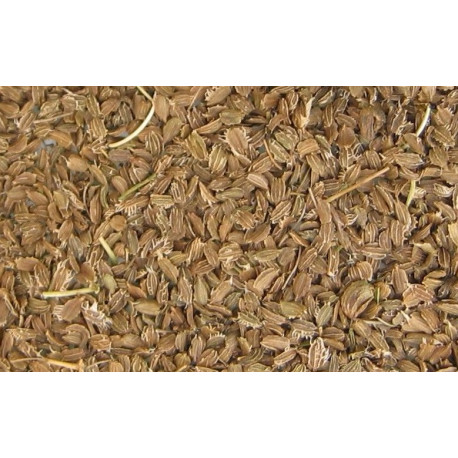- In the process of being restocked




Reference: 169202-500G
Carrot seeds are very rich in vitamins with a high proportion of vitamin A and carotene, as well as vitamin B, calcium and valuable carbohydrates.
Carrot seeds are very rich in vitamins with a high proportion of vitamin A and carotene, as well as vitamin B, calcium and valuable carbohydrates.
Properties of Pine or Larix seeds.
Anti-inflammatory, analgesic, antispasmodic,
Antiseptic, anti-infectious (pneumococci),
Decongestant of the small pelvis and prostate,
Diuretic
Expectorant, tonic for the respiratory organs.
Striated sunflower is the basic seed of any parrot mixture. It is also used in mixtures for parakeets and exotic doves.
It is also the favorite food of your outdoor birds during the winter period! Ideal for feeding the birds in your garden.
Practical information for giving sunflower seeds to birds in your garden:
Remember to regularly clean the feeders of your outdoor birds so that diseases and bacteria do not thrive.
Also consider setting feeders high up to prevent predators (such as cats, foxes, etc.) from targeting birds when they are eating.
The 1 kg white Perilla from the Manitoba brand is a high-quality food specially designed for birds.
Features and Benefits:
- Natural and Pure: White perilla is a natural, pure, and untreated seed, offering a healthy source of nutrition for birds.
- Rich in Nutrients: It is particularly rich in omega-3 fatty acids, essential for the overall health of birds, especially for their cardiovascular and immune systems.
- Plumage Health: Regular consumption of white perilla helps maintain shiny and healthy plumage thanks to its nutritional properties.
Couscous is a hard grain semolina that is steamed until the small grains are obtained, which are then dried. Couscous is excellent for supplementing the feeding food of nestlings or adults. Wet the couscous with hot water, let it swell for a few minutes then add to the egg food (for 1 teaspoon of couscous plan 4-5 teaspoons of food), coloring, fruit.
Extra wheat, very good quality, for all types of birds and ornamental animals, pigeons, chickens, parrots, parakeets, doves...
Birds like to remove the shells from peanuts and then eat the peanuts. Peanuts are a source of energy, which is very important for the long winter months.
Unpeeled peanuts can be given to parrots as a treat.
Pine seeds are a good source of Phosphorus, Magnesium, Zinc, Manganese, Copper, Iron, Vitamin E, K, B1, B2, B3, B9.
Sunflower seed contains almost 40% fat, but also proteins, carbohydrates, vitamins B and E. We quantify on a sunflower seed nearly 600 Kcalories per 100 g.
It satisfies throughout the year, the needs of a wide variety of birds, including the smallest of them.
Sunflower seeds are a real treat for our birds who love them!
Pine seeds are a good source of Phosphorus, Magnesium, Zinc, Manganese, Copper, Iron, Vitamin E, K, B1, B2, B3, B9.
The evening primrose is an annual or biennial, rustic, which can be found naturally at the edge of paths near the Atlantic and Mediterranean coasts but also on the embankments of railways. Its erect stems are lined with large rosettes of downy leaves veined with red, between 10 and 30 cm long, oblong in shape, lanceolate, toothed, a little sticky.
Canary grass is a nutritious seed particularly appreciated by many birds. Its high protein and fibre content makes it an essential food for the good health and vitality of birds. It is especially ideal for canaries, budgerigars, serins, and other small exotic birds.
Characteristics:
- Ingredients: 100% natural canary grass.
- Appearance: Elongated seeds, from pale yellow to light brown in colour.
- Nutritional Value: Rich in proteins (about 16%), fibres, and essential amino acids.
- Benefits:
- Promotes good digestion thanks to its fibre content.
- Contributes to the shine of plumage.
- Provides the necessary energy for birds' daily activities.
The thistle-Marie seed has hepatoprotective properties. It is therefore excellent for our birds to avoid liver problems as a preventive measure.
Millet is used in the diet of all birds: straight beaks and hooked beaks. In bunches, it's a treat they love.
Cluster millet has a good protein and carbohydrate content and also contains a large number of amino acids. Ideal for distracting your birds and thus avoiding pecking (feather pulling).

Carrot seeds are very rich in vitamins with a high proportion of vitamin A and carotene, as well as vitamin B, calcium and valuable carbohydrates.
